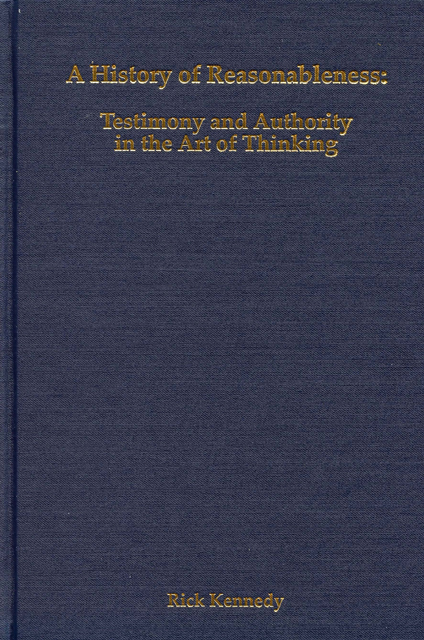Book contents
- Frontmatter
- Dedication
- Contents
- List of Figures
- Acknowledgments
- Introduction: The King of Siam and Assent to the Existence of Ice
- One The Classical Tradition of Testimony in Topics
- Two Three Medieval Traditions: Augustine, Boethius, and Cassiodorus
- Three Two Renaissance Traditions: Ciceronian and Augustinian
- Four The Long Influence of The Port-Royal Logic
- Five Appreciating Aristotle: Thomists, Scots, and Oxford Noetics
- Six Testimony Becomes Experience: The Rise of Critical Thinking
- Bibliography
- Index
Four - The Long Influence of The Port-Royal Logic
Published online by Cambridge University Press: 17 March 2023
- Frontmatter
- Dedication
- Contents
- List of Figures
- Acknowledgments
- Introduction: The King of Siam and Assent to the Existence of Ice
- One The Classical Tradition of Testimony in Topics
- Two Three Medieval Traditions: Augustine, Boethius, and Cassiodorus
- Three Two Renaissance Traditions: Ciceronian and Augustinian
- Four The Long Influence of The Port-Royal Logic
- Five Appreciating Aristotle: Thomists, Scots, and Oxford Noetics
- Six Testimony Becomes Experience: The Rise of Critical Thinking
- Bibliography
- Index
Summary
The Port-Royal Logic was first published in French in 1662 and was initially titled La Logique ou l’art de penser. For its first half century of European use, its popular Latin translation was called Ars Cogitandi. Over two centuries of common use, it was sometimes referred to as the Jansenist Logic but most often simply called The Port-Royal Logic. Like Quintilian’s Institutio, The Port-Royal Logic is pleasantly readable, wisdom-filled, and organized for easy use by young students and old teachers. Although rooted in the mathematics-inspired reasoning methods of René Descartes, the textbook also offered a longer, stronger, and deeper recommendation for testimony in the art of being reasonable than any previous textbook. Most importantly it dismissed the Aristotelian tradition of topics, modeled a new four-part structure in which the first three parts described reasoning in geometrical fashion and the fourth advised on the broader matters of reasonableness. Testimony, probability, and degrees of assent were important aspects of this larger reasonableness. As the Ars Cogitandi—the Art of Thinking—it became the most influential general education textbook of the eighteenth and nineteenth centuries.
Key to The Port-Royal Logic’s discussion of testimony was, first, a traditional Aristotelian optimism about the persuasiveness of truth even among humans prone to error and deception. Second, it overflows with an Augustinian emphasis on the rightly oriented will and simple good sense. Laziness and lack of concern for the truth were presented as the enemies of reasonableness. Vigor, conscientiousness, and trust along with a measure of good sense were the start-up qualifications for thinking well and deciding wisely. “Right reason,” The Port-Royal Logic states, “accords all things their appropriate status. It makes us doubt those that are doubtful, reject those that are false, and recognize in good faith those that are evident.” Third, in Renaissance humanist fashion, The Port-Royal Logic advocates the naturalness of reasoning well. Technical terms, memorization of syllogistic forms, and frustrating added baggage were logomachies to be jettisoned. Finally, the book advocated mathematicizing good judgment. Dialectical probability was given more rigor through mathematics, and The Port-Royal Logic spurred long-influential attempts to treat testimony like a math problem. Disarmingly written, the book synthesized classical traditions, Cartesian reasoning, and Augustinian reasonableness in a way that encouraged and empowered readers.
- Type
- Chapter
- Information
- A History of ReasonablenessTestimony and Authority in the Art of Thinking, pp. 127 - 174Publisher: Boydell & BrewerPrint publication year: 2004



